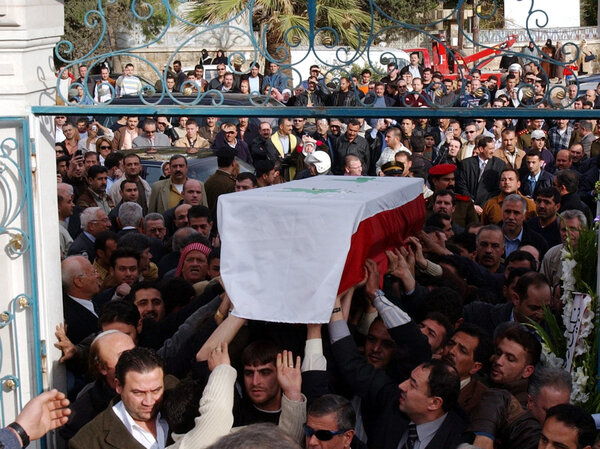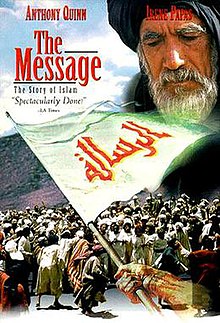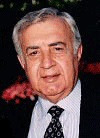This is shown being of the film
The Message - 1976
The film was nominated for an Oscar in 1977 for Best Original Score for the music by Maurice Jarre.
THE PLOT
Muhammed is visited by the angel Gabriel, which shocks him deeply. The angel asks him to start and spread Islam. Gradually, almost the entire city of Mecca begins to convert. As a result, more enemies will come and hunt Muhammad and his companions from Mecca and confiscate their possessions. They head north, where they receive a warm welcome in the city of Medina and build the first Islamic mosque. They are told that their possessions are being sold in Mecca on the market. Mohammed chooses peace for a moment, but still gets permission to attack. They are attacked but win the Battle of Badr. The Meccans want revenge and beat back with three thousand men in the Battle of Uhud, killing Hamza ibn Abd al-Muttalib. The Muslims ran after the Meccans and left the camp unprotected. Because of this, they were surprised by riders from behind, so they lost the battle. The Meccans and the Muslims closed a 10-year truce. A few years later, Khalid ibn Walid, a Meccan general who killed many Muslims, converted to Islam. Meanwhile, Muslim camps in the desert were attacked in the night. The Muslims thought that the Meccans had done so. Abu Sufyan came to Medina fearing retribution and claiming that it was not the Meccans, but robbers who had broken the truce. None of the Muslims give him an audience, claiming he "observes no treaty and keeps no pledge." The Muslims respond with an attack on Mecca with very many troops and "men from every tribe". Abu Sufyan sought an audience with Muhammad on the eve of the attack. The Meccans became very scared but are reassured that no one will be abused and any in their house, by the Kaaba, or in Abu Sufyan's house will be safe. They surrendered and Mecca came into the hands of the Muslims. The Pagan images of the gods in the Kaaba were destroyed, and the very first azan in Mecca was called on the Kaaba by Bilaal Ibn Rabaah.
ControversialHe intended the film as a bridge for understanding between Islam and the West. But it would prove extremely difficult to make, and faced a backlash in many parts of the Muslim world — and was even linked to a violent event in Washington, D.C.
He was honoured by his native city of Aleppo, and the Aleppo City Council has renamed a school and a street after Moustapha Akkad. In 2008, a street in downtown Beirut was renamed after Moustapha Akkad. The 2007 remake of Halloween was dedicated to Moustapha Akkad. The 2018 film Halloween, a direct sequel to the 1978 original film that ignores all other films in the franchise, also features a dedication to Akkad in the end credits.
x
He was honoured by his native city of Aleppo, and the Aleppo City Council has renamed a school and a street after Moustapha Akkad. In 2008, a street in downtown Beirut was renamed after Moustapha Akkad. The 2007 remake of Halloween was dedicated to Moustapha Akkad. The 2018 film Halloween, a direct sequel to the 1978 original film that ignores all other films in the franchise, also features a dedication to Akkad in the end credits.
x
"Being Muslim myself who lived in the West, I felt that it's my obligation, my duty, to tell the truth about Islam," Akkad said in an interview in 1976. "I thought I should tell the story that will bring this bridge."
With money raised from Middle Eastern sources, Akkad set to work on a Quranic film on the same scale as biblical Hollywood spectacles like The Ten Commandments and Ben-Hur.
He began filming in late 1974. To make his movie accessible to both the Islamic world and the West, Akkad shot it simultaneously in two versions, Arabic and English. The Arabic version featured some of the biggest stars of Muslim cinema.
The English version, which received an Oscar nomination for Best Original Score, starred Anthony Quinn, playing the prophet's uncle Hamza, and Irene Papas as Hind, a Meccan woman who long opposed the prophet's forces but eventually became Muslim.
There was a major challenge, though: Images of the Prophet Muhammad are forbidden in Islam. So the main character is never shown. "Not only do you not see Muhammad, you never even see his shadow," Quinn told People magazine. The prophet's presence is suggested when other characters speak to the camera directly, as if to a vision of revelation. They repeat the prophet's words.
"To figure out a way to have the prophet become a person without showing him — it was brilliant," says Islamic scholar Khaled Abou El Fadl, a close friend of Akkad. "It was genius."
Akkad wanted viewers "to feel the prophet as a human being, but respect the fact that most Muslims don't want the prophet to be personified by an actor or another," Abou El Fadl says.
London-based actor Garrick Hagon played Ammar, one of the prophet's companions. "At that time, we didn't know much about Islam," he says. "Muhammad was a name, and that was about all. So it was all pretty much of a revelation."
The vision Akkad presents in the film is of Islam as a great world religion in harmony with other spiritual traditions. "God has spoken to us before through Abraham, Noah, Moses," one character says. "And through Jesus Christ!"
In a key scene, Muhammad's followers are interrogated by the Christian king of Abyssinia and must justify their beliefs under pain of death. "Muhammad teaches us to worship one God," one says. "To speak truth. To love our neighbors as ourselves."
Moustapha Akkad's son, Malek Akkad, says this message of unity was important to his father. "That was definitely the scene that he would point to most often as his favorite scene," he says. "What he was trying to achieve in that film is that we're really not far apart in these beliefs."
But the filmmaker knew he faced critics. The script was vetted page by page by Islamic scholars in Cairo. The prophet's name was eventually removed from the original title — Mohammad, Messenger of God — and the film was renamed simply as The Message.
After filming was underway in Morocco, Saudi political pressure cost Akkad his expensive Moroccan sets and locations. So he moved filming to Libya, with the controversial support of Libyan leader Moammar Gadhafi.
"My father was of one mind, that he was going to finish this film," says Malek Akkad. "And so where he could get assistance from, he did."
Controversy mounted. The Cairo scholars who had initially approved the shooting script withdrew their support and called the completed film, which was released in 1976, "an insult to Islam." More backlash followed and several countries banned the film.

"He was confounded by the controversy that exploded around the movie," says Abou El Fadl. "It was banned all over. Banned in Saudi Arabia, in Kuwait. Banned in Egypt."
In the U.S., things turned tragic. In 1977, members of the Hanafi movement, a militant black nationalist Muslim group, stormed several buildings in Washington, D.C., taking hostages and killing two during a three-day siege. The Hanafi demands included banning The Message, which they deemed sacrilegious.
"I'm sure they had not seen the film," says Abou El Fadl. "As Moustapha described it, it's a sign of the tragedy of our cultural weakness."
Years later, tragedy found Akkad again. In 2005, he was injured and later died and his daughter Rima was killed in a suicide attack at a Jordanian hotel where they were attending a wedding. It was part of a wave of al-Qaida bombings in Amman, the capital.
"It's as if some demonic power was mocking all our dreams," says Abou El Fadl. "Because Moustapha represented hope."
Akkad's son Malek clings to that hope. "He lived the life of five men, literally. So in the scheme of things, that gives me some comfort," he says of his father. "My sister, of course, was hand in hand in that. And that's really, for me, the much darker side of this."
In the West, Moustapha Akkad isn't remembered for The Message. He's best known as the executive producer of the Halloween series of slasher films, a mantle that Malek has since assumed.
But 40 years on, The Message is a touchstone in the Arab world, where it has circulated widely in pirated editions. Malek is restoring the film for a high-definition rerelease.
"I think Moustapha is going to enter the history books as a hero and a pioneer," says Abou El Fadl. "If we could fast-forward 100 years from now, we would be amazed."
Moustapha Al Akkad (Arabic: مصطفى العقاد; July 1, 1930 – November 11, 2005) was a Syrian American film producer and director, best known for producing the original series of Halloween films and directing The Message and Lion of the Desert.
He was killed along with his daughter Rima Al Akkad Monla in the 2005 Amman bombings.
The Messenger.
In 1976, he produced and directed Mohammad, Messenger of God (released as The Message in 1977 in the United States), starring Anthony Quinn and Irene Papas. Akkad faced resistance from Hollywood, which forced him to make the film in Morocco.
Abstract
This essay examines the historical accuracy of the 1976 movie, The Message. It investigates the historical accuracy of the movie in three categories; the costumes, the historical events shown in the movie, and the beliefs and values taught in the Islamic religion. This movie is considered to be historically accurate in terms of the costumes. The costumes used in this movie are excellent indicators of the rank, personality, and the surroundings of the character portrayed. One can easily learn about the characters by looking at the costumes worn. Most historical events that occurred in the time of the prophet were depicted properly. Major events such as the declaration of the Islamic faith, the first martyr of Islam and the migration to Abyssinia were portrayed accurately without any disrespect to the Islamic religion. The values and beliefs of the characters in the movie greatly influenced their actions. The plot of the movie revolved around the Islamic faith, which taught people many concepts. The Islamic faith declared that everyone is equal in the eyes of god, which tempted many people to convert to Islam, as many people especially slaves, were not treated unfairly. This movie is considered by many critics as a historically accurate representation of the establishment of the Islamic faith.




Comments
Post a Comment